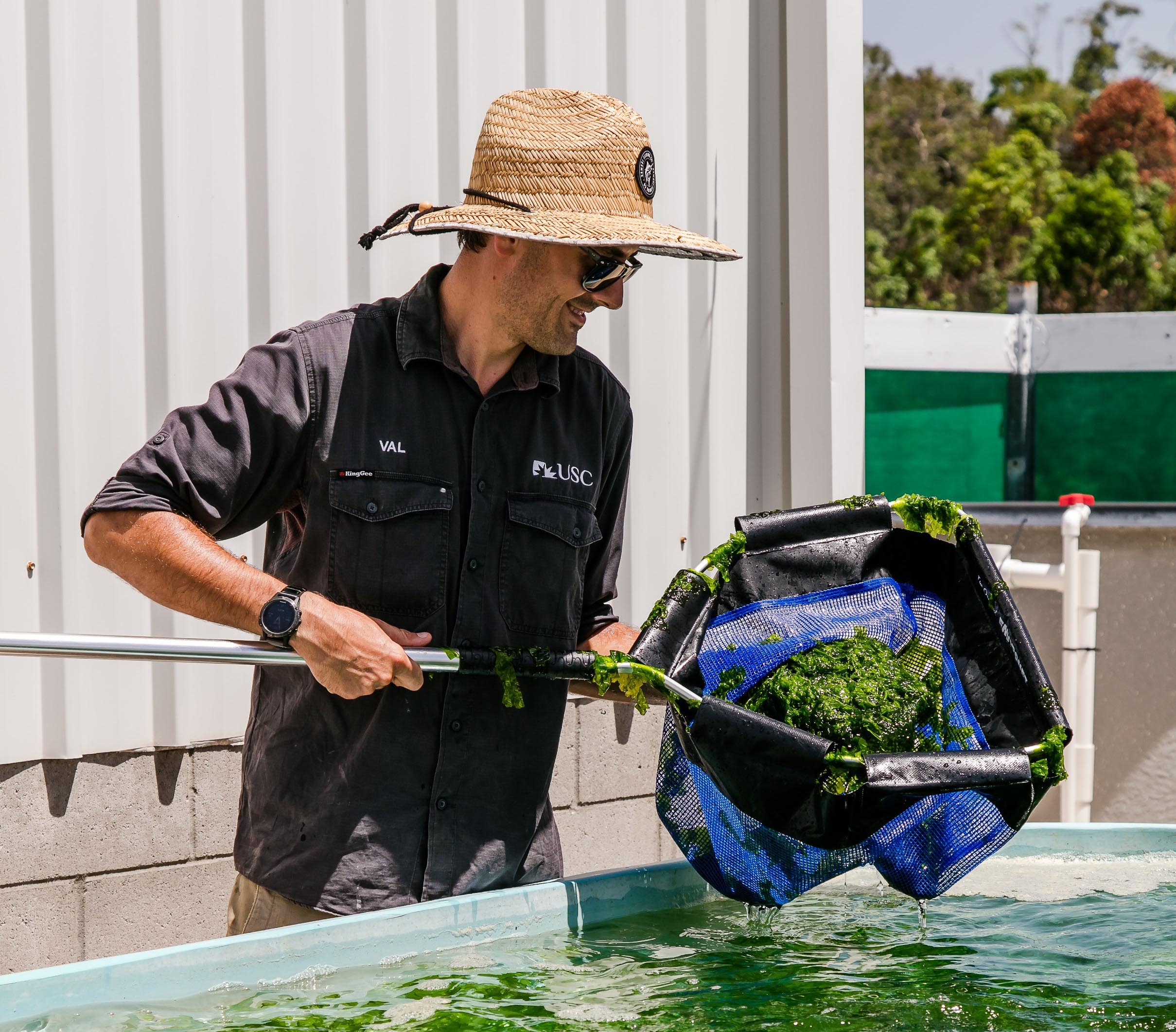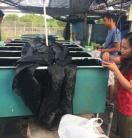Super seaweed improves fish immunity
New ACIAR-supported fisheries research has uncovered potentially ground-breaking alternatives to veterinary drugs to combat aquaculture diseases.
Aquaculture produces more than 50% of the seafood consumed globally, but disease outbreaks pose persistent threats to its further development and cost the global industry more than AU$8 billion every year.
Piloted by the University of the Sunshine Coast (USC), the key findings discovered several seaweed species could boost the immunity of farmed fish—as high as four times in some cases—when added to fish diets as a powdered additive.
The new research could also mean an end to the dependency on veterinary drugs that can sometimes be detrimental to the environment, to animals and consumers.
Seaweeds grow in abundance through the coastal regions of Australia and the Pacific region and have many uses such as food, fertilisers and cosmetics.
Led by USC PhD candidate Valentin Thépot, the key findings discovered several seaweed species could boost the immunity of farmed fish—as high as four times in some cases—when added to fish diets as a powered additive.
The research findings was recently published in a scientific journal and indicated that small amounts of red seaweed called Asparagopsis resulted in significant improvement in fish’s innate immune responses.
The same seaweed has been found to reduce methane emissions in cows and other ruminants when supplemented in their diets, which may prove to have significant application globally in reducing greenhouse gas emissions in the agriculture sector.
Mr Thépot explained that his research investigated the potential of seaweeds as a functional ingredient in the diet of farmed fish.
‘The mottled rabbitfish Siganus fuscescens was chosen as a model species for the work as it is abundant on the Sunshine Coast and an excellent candidate for a for a range of reasons including their low-trophic level (opportunistic omnivore), so they do not require wild-caught fish as part of their diet’.
‘With wild fisheries being fished at maximum capacity, the sustainable development of novel aquaculture, low-trophic level, fish species is important’, he said.
‘The idea behind this research was to find alternatives to veterinary drugs such as antibiotics to boost the immune system for fish so that they are most resistant to pathogens and thus wouldn't require veterinary treatment in the future', Mr Thépot added.
Of the 11 seaweeds that the team tested, two others showed promising immunostimulatory potential: the brown seaweed Dictyota doubled one of the fishes' innate immune response and the green seaweed Ulva almost did the same.
'Our trial showed that the fish treated with seaweed had strong innate immune responses, often surpassing that of the fish fed one of the four commercial immunostimulant ingredients also tested in this study.
‘The results of this research highlight the promising potential of seaweeds as functional ingredient in farmed fish to boost their immune defences and make them more resistant to disease causing pathogens'.
Mr Thépot said fish had a similar innate immune system to poultry, pigs, cattle, and other farmed animals, meaning that seaweed could also benefit different livestock industries globally.
'There is no reason that the seaweed's ability to strengthen the immune system to fight infection and disease would be just limited to fish, ultimately we (vertebrates) have all evolved from fish', he added.
Professor Nick Paul, who is part of the USC Seaweed Research Group, added that the research is fundamental for aquaculture globally.
The USC has patented the process for commercial use, confident in the enormous market potential for natural seaweed additives in Australia and across the world.
'While there is an abundant supply of Asparagopsis in the wild in Australia, the Pacific Islands and parts of Europe (which has helped kickstart research and development), the wild harvest of seaweed for commercial purposes has its limitations', he said.
Professor Paul added that the USC was excited to lead this work on nature-based innovations for food production.
‘Promoting the immune system of the fish in a natural, organic way, rather than relying on veterinary drug for managing disease outbreaks, is ultimately better for the environment and for us’, he added.
ACIAR Research Program Manager for Fisheries, Professor Ann Fleming commented that ACIAR is proud to have supported this research.
‘Our fisheries program aims to strengthen the seaweed-based livelihoods of women and men in our partner countries —providing sustainable economic and social benefits.’
‘Now this exciting research is showing not only it has the potential to benefit agriculture globally, but the aquaculture sector as well, Professor Fleming added.
This research was part of a PhD programme supported by the USC and ACIAR under the project: Accelerating the development of finfish mariculture in Cambodia through south-south research cooperation with Indonesia.




